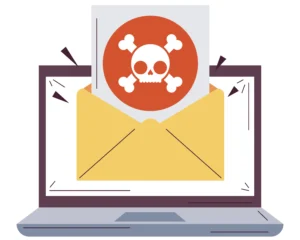Have you noticed? Your inboxes are constantly overflowing with unwanted promotional emails, text messages, offers, and spam. Now more than ever, businesses should learn about the regulations that govern commercial electronic messaging and understand the rules of doing business via email to help them reach their audience without being pushy while staying compliant.
In this article, we’ll get into the definition of CAN-SPAM, the key aspects that every sender should be aware of, and valuable insights into how businesses can apply these regulatory steps effectively. Read on.
What is CAN-SPAM?
The CAN-SPAM or Controlling the Assault of Non-Solicited Pornography and Marketing Act is a United States subset law passed in 2003 by the US Congress. The primary purpose of this law is to help regulate the circulation and distribution of deceitful electronic messages in the market that target unsuspicious audiences.
The CAN-SPAM Act makes email recipients entitled to the sender’s identity and location and can opt out of these marketers’ email lists anytime. Generally reinforces public safety and privacy and serves as a protection for recipients from scammy or unsolicited content, suspicious commercial electronic mail messages, media, and other related materials online.
Should marketers comply with the CAN-SPAM Act?
It’s the best choice for marketers and organizations to comply with the rules if they want to maintain trust and credibility with their audience and the regulations. It’s the industry’s standard that marketers comply with the CAN-SPAM Act to avoid legal problems surrounding the issue of “electronic mail message exploit”.
Following the rules and regulations, individual marketers and organizations can demonstrate respect for recipients’ privacy, help reduce their risk of expensive and time-consuming legal penalizations, and greatly contribute to a safer and more trustworthy online environment—fostering positive relationships with customers and prospective leads and enhancing brand reputation and loyalty.
Going back to the question, we believe that complying with the Act shouldn’t be a question at this point moving forward.
How to Avoid CAN-SPAM Penalties and Violations

Marketers are expected to be aware and careful about the CAN-SPAM Act and the possible penalties for non-compliance. To avoid having to deal with penalties and problems down the line, here are the simplest requirements email marketers and organizations should follow:
Do not use fake or inaccurate sender information. Email recipients are entitled to the identity of the email sender. The sender’s personal information must be accurately presented and identify the person or the business’ name.
Do not use misleading subject lines. Subject lines should be thoughtfully written and must accurately reflect the content or the intention of the email body.
Indicate or clarify to the reader if your message is an advertisement. Senders, at all costs, must avoid bringing up confusion to the email recipients. From the get-go, disclose plainly if an email is a transactional or relationship message.
Mention where your location is. A legally compliant email must include the sender’s location, valid physical postal address, or an office box they’ve registered with the postal service with a commercial mail-receiving agency established under the Postal Service regulations.
Add an opt-out feature to your marketing emails. This is a very important feature that must be included for marketers sending commercial emails. To include clear information on how a recipient can opt out of receiving either transactional or relationship marketing emails at their convenience.

Optimize opt-out request processing. According to FTC, any opt-out mechanism must be able to process opt-out requests for at least 30 days after you send your message or follow-up.
Keeping a close eye on the activity of your outsourced marketing services. Outsourcing third-party services to handle your email marketing doesn’t waive your legal responsibilities. Both the company whose product is being promoted in the emails and the company distributing the message are equally responsible and equally penalized if guilty.
Email and Messages where The CAN-SPAM Act Applies
The CAN-SPAM Act serves as the regulator of various types of emails and formats that businesses send out. The CAN-SPAM Act makes sure that all emails are honest and respectful toward their recipients, and that all compliance requirements are met. The following are the email and messaging formats where the law applies:
Commercial Messages. These are emails and messages that try to sell stuff, like a commercial advertisement or deal. Anything that talks about getting new things, trade-ins, promos, or as simple as availing discounts and coupon codes is regarded as a commercial message.
Transactional Messages. These are follow-up emails to help customers with things they’ve already agreed to do, like letting them know that an order’s been confirmed or that their package is on its way.
Relationship Messages. These are friendly messages with the ultimate goal of keeping in touch with prospects and customers and maintaining the customer-vendor relationship. Relationship messages can take the form of newsletters or updates about products that a customer has bought before or showed interest in.
Mixed Messages. Emails that have a bit of everything – some selling, some helpful info, some link to an internet website, and maybe one with a fishy subject line with a friendly note. The CAN-SPAM Act has a particular method of regulating and handling a mixed-up commercial electronic mail message to make sure they’re clear and compliant.
Note: The CAN-SPAM Act may apply to any commercial communication sent to recipients within the United States.
For further clarification, The CAN-SPAM Act does not apply to an email that is purely transactional in regards to not sending to email addresses that have opted out.
How CAN-SPAM Violators Are Penalized
Reference: [https://www.jdsupra.com/legalnews/taking-another-look-at-courts-7576665/]
Non-complying individuals or entities may be subject to civil penalties, criminal charges, state enforcement, private lawsuits, and irreversible damages to one’s reputation.
On top of civil fines, violators might have to pay back consumers under Section 19 of the FTC Act. This could mean returning the cost of what the people paid, plus paying for the time they lost dealing with the spam.
To address these concerns, marketers and businesses alike must develop new systems to produce and distribute compliant content online. Let’s say, for example, building new email marketing practices and strategies, reinforcing recipient consent acquisition, revamping opt-out mechanisms, and maintaining accurate sender information to avoid penalties.
How can recipients report CAN-SPAM violations?

UnsubCentral recommends three options to manage CAN-SPAM violation reports:
Directly report the spam sender to the Federal Trade Commission. By reporting violators to the FTC directly, they can perform immediate action to take down the spammers and prevent the problem from progressing.
Tipping the FTC about rule-breakers helps make sure the CAN-SPAM Act is acting its role, making email safer for everyone. FTC is the agency facilitating compliance with the CAN-SPAM Act. They can punish those who break the rules with fines and other punishments, which makes them less likely to do it again and keeps people safe from spam and fake emails.
Forward the spam emails to their email provider. By reporting violators to their email provider, individuals provide valuable information that helps the provider identify and address abusive senders, thereby protecting their users from unwanted and potentially harmful emails.
Email providers often have dedicated teams or automated systems to investigate reports of spam and take appropriate action, such as suspending or terminating accounts found to violate their terms of service. Email providers may share information about repeat offenders with other providers, helping to prevent spam from reaching a wider audience.
Mark the message as Spam. Marking messages in private inboxes as spam provides valuable feedback and information to mailing service providers—indicating that certain messages are potentially malicious. Spam filtering algorithms benefit from this as they help them learn through machine learning to prevent similar messages from reaching inboxes and those of other users.
One way to slowly reduce the risk of falling victim to phishing scams, malware, and other online threats is by actively marking malicious messages as spam. This way, users can contribute to a cause for a safer and more efficient email experience for themselves and the community.
Read this next blog: CAN-SPAM Act: A Compliance Guide for Business
Frequently Asked Questions About CAN-SPAM Act and Compliance
Here are some of the CAN-SPAM Act Compliance questions that can benefit marketers and organizations alike on how to optimize marketing emails.
Are there special rules for emails with sexual content?
Yes, the FTC has set rules under the CAN-SPAM Act for emails with sexual content. They must start with “SEXUALLY-EXPLICIT:” in the subject line and have limited visible content when opened. Recipients only see the warning and necessary details like sender information. No pictures are allowed until the recipient takes action. However, if someone already agreed to receive such emails, these rules don’t apply.
Under the CAN-SPAM Act, is permission still required to send commercial emails?
What happens if you leave out your address in an email you’re selling things in?
Can I send transactional emails without an opt-out mechanism under CAN-SPAM?
You can, but you shouldn’t. As you can see, it’s good practice for marketers and organizations to offer recipients the option to unsubscribe from non-transactional emails. Providing an opt-out mechanism only demonstrates professionalism, transparency, and respect for recipients’ preferences and intentions, contributing to a positive sender-receiver relationship.
If your values no longer align, don’t be afraid to let go.
Who is responsible for CAN-SPAM compliance for forwarded messages?
Attributing responsibility for forwarded messages under CAN-SPAM depends on the context. If the sender incentivizes forwarding with rewards like money or coupons, they likely bear compliance responsibility. This principle extends to situations where individuals are paid or reimbursed for generating website traffic or referrals.
CAN-SPAM holds accountable the party initiating and encouraging such email forwarding activity.
Do CAN-SPAM regulations apply to messages like order confirmations or account updates?
Short answer, yes. Transactional emails serve a very specific purpose tied to a user’s existing action. While these messages are excused from any particular CAN-SPAM requirement, like requiring an “Unsubscribe” button, they are still held to standards of accuracy and transparency.
Final Thoughts
The CAN-SPAM Act ensures that businesses complies to the guidelines that promote transparency, honesty, and respect for their email recipients. When requirements are thoroughly followed, businesses can skip potential penalties, including expensive fines, criminal charges, and long-term or permanent reputational damage.
Sticking to the rules of the CAN-SPAM Act enables marketers and sales representatives to focus on creating engaging content and outreach strategies without worry, leading to potentially higher response and engagement rates.
Additionally, by maintaining compliance with the Act, businesses can reach audiences who are genuinely interested in their products or services and nurture the relationship from there moving forward—increasing the likelihood of generating more sales and securing loyal brand followers.
Because let’s face it. The last thing any business wants is to face financial loss and permanent damage to one’s reputation for failing to comply with anti spam laws.

